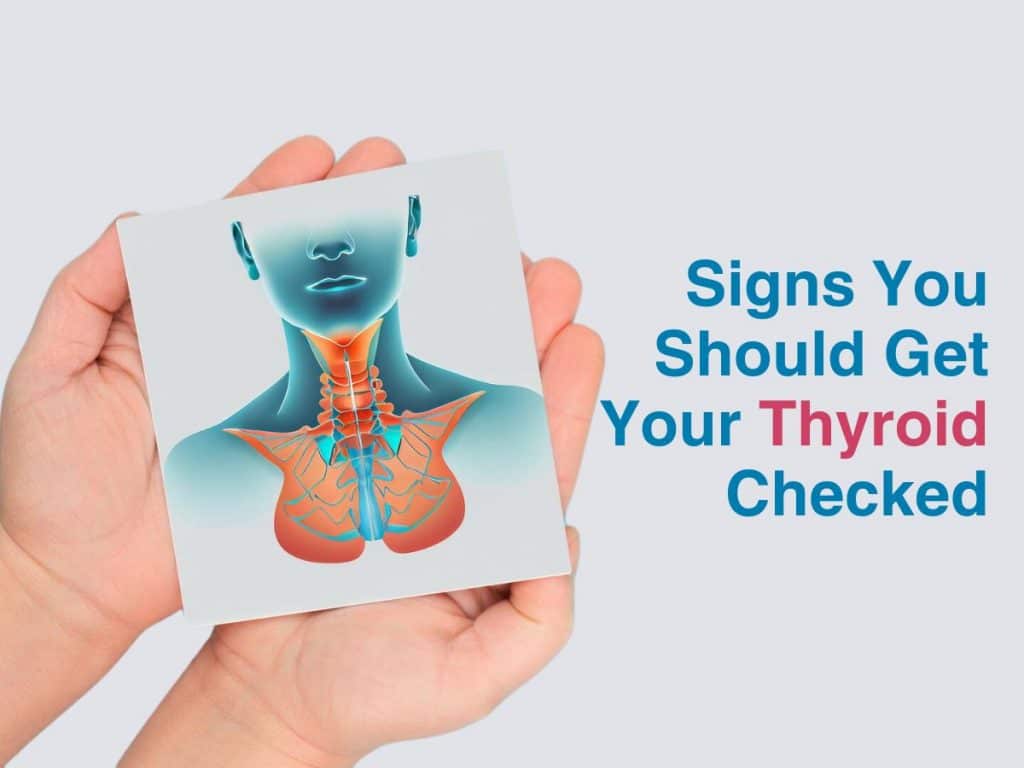
Signs You Should Get Your Thyroid Checked
 Introduction
Introduction
Think of the thyroid gland as a butterfly-shaped sentinel in your throat that is tasked with regulating a multitude of bodily functions, that works in perfect harmony with the pituitary gland as the main general orchestrating all the hormonal moves needed to ensure you have a great, problem-free day, every day, all through your life. It is a lot of responsibility, and there are many ways things can go wrong. Read on to see what could, and how we can manage such conditions.
Thyroid Symptoms that Should not be Ignored
There are two possibilities – hypothyroidism (less-active thyroid) and hyperthyroidism (hyperactive thyroid) respectively. India has a significantly high disease burden- 1 in 3 individuals present with some issue of the thyroid, with the prevalence of hypothyroidism being the highest- at 11% almost. Watch out for these symptoms, and get tested if you are doubtful- feeling too much fatigue, quick weight loss or gain, mood swings with irritability, depression or even anxiety, change in body temperature and heart rate, and great difficulty falling asleep. You may also notice some swelling in the neck region (goiter).
Common Signs of Thyroid Disease in Women
In addition to all the above-mentioned symptoms, women also exhibit menstrual irregularities. Interestingly, the incidence of thyroid disease is higher in females than in males. There is an autoimmune component to thyroid disease, and studies have shown that women are much more prone to suffer from autoimmune disorders, as compared to their male counterparts. We don’t exactly know why, but it could possibly be because excessive stress is one of the causative factors. It is also probably because our hormonal cycle is much more intricate and needs high levels of regulation, due to the presence of menstrual cycles or ensuring a pregnancy takes to term.
Physical Signs You Need a Thyroid Test
Since there are two possibilities – hypothyroidism and hyperthyroidism, the symptoms you may exhibit will vary. Let us look at them all, in a simple table-
|
Symptom |
Hypothyroidism (Underactive Thyroid) | Hyperthyroidism (Overactive Thyroid) |
|
Weight Changes |
Weight gain | Weight loss |
|
Fatigue |
Feeling tired or sluggish | Restlessness, nervousness, and insomnia |
|
Mood Changes |
Depression, mood swings | Anxiety, irritability, nervousness |
|
Body Temperature |
Feeling unusually cold | Feeling unusually warm or hot |
|
Heart Rate |
Bradycardia (slower heart rate) | Tachycardia (rapid heart rate) |
|
Menstrual Changes (Women) |
Irregular or heavy menstrual periods | Light or absent menstrual periods |
|
Hair and Skin Changes |
Dry and brittle hair, hair loss | Thin and fragile hair, excessive sweating, and oily skin |
|
Bowel Movements |
Constipation | Diarrhea |
|
Sleep Patterns |
Difficulty sleeping or excessive sleepiness | Insomnia |
|
Swelling in the Neck |
Goiter | Goiter |
|
Libido Changes |
Decreased interest in sex | Changes in sexual desire or even increased libido |
|
Heart Palpitations |
May occur | Common, presents with chest pain too |
Conclusion
The above table will teach you this – that the thyroid gland is responsible for maintaining a whole range of bodily functions. Too much or too little of hormones can cause various symptoms. People normally display a group of them, but not all at the same time. The easiest way to check is to get a thyroid function test, which should give you the values for T3, T4, and TSH – and any deviations from the normal range can be managed with medication, and making sustainable changes in your lifestyle.
Frequently Asked Questions

Dr. Sudhakar Reddy P
MBBS, MD, DM (Endocrinology)
Consultant Endocrinologist






